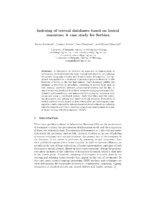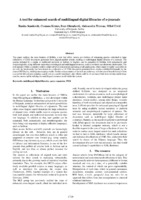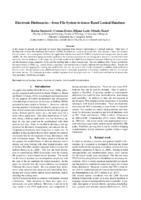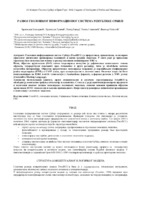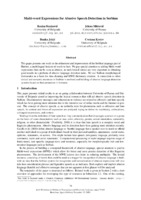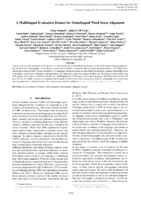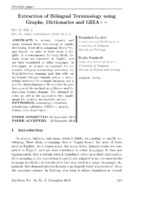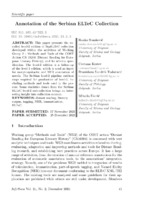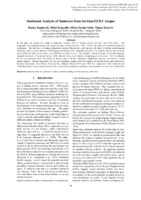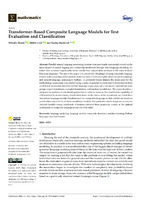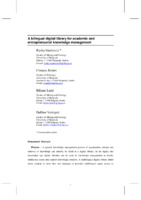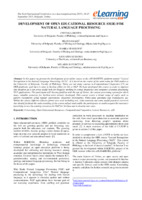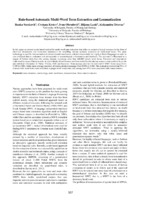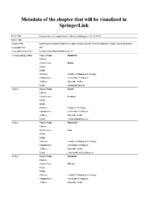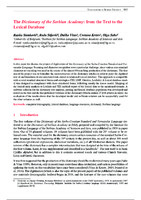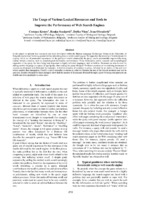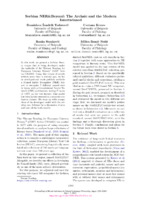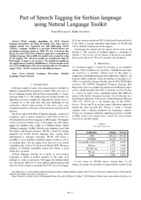Претрага
214 items
-
Indexing of textual databases based on lexical resources: A case study for Serbian
In this paper we describe an approach to improvement of information retrieval results for large textual databases by pre-indexing documents using bag-of-words and Named Entity Recognition. The approach was applied on a database of geological projects financed by the Republic of Serbia in the last half century. Each document within this database is described by metadata, consisting of several fields such as title, domain, keywords, abstract, geographical location and the like. A bag of words was produced from these ...Ranka Stanković, Cvetana Krstev, Ivan Obradović, Olivera Kitanović. "Indexing of textual databases based on lexical resources: A case study for Serbian" in Semantic Keyword-based Search on Structured Data Sources : First COST Action IC1302 International KEYSTONE Conference, IKC 2015, Coimbra, Portugal, September 8-9, 2015. Revised Selected Papers, Springer (2015). https://doi.org/10.1007/978-3-319-27932-9_15 M13
-
A Tool for Enhanced Search of Multilingual Digital Libraries of E-journals
This paper outlines the main features of Bibliša, a tool that offers various possibilities of enhancing queries submitted to large collections of TMX documents generated from aligned parallel articles residing in multilingual digital libraries of e-journals. The queries initiated by a simple or multiword keyword, in Serbian or English, can be expanded by Bibliša, both semantically and morphologically, using different supporting monolingual and multilingual resources, such as wordnets and electronic dictionaries. The tool operates within a complex system composed ...Ranka Stanković, Cvetana Krstev, Ivan Obradović, Aleksandra Trtovac, Miloš Utvić. "A Tool for Enhanced Search of Multilingual Digital Libraries of E-journals" in Proceedings of the 8th International Conference on Language Resources and Evaluation, LREC 2012, May 2012, Istanbul, Turkey, Istanbul, Turkey : European Language Resources Association (2012) M33
-
Electronic Dictionaries - from File System to lemon Based Lexical Database
In this paper we discuss some well-known morphological descriptions used in various projects and applications (most notably MULTEXT-East and Unitex) and illustrate the encountered problems on Serbian. We have spotted four groups of problems: the lack of a value for an existing category, the lack of a category, the interdependence of values and categories lacking some description, and the lack of a support for some types of categories. At the same time, various descriptions often describe exactly the same ...Ranka Stanković, Cvetana Krstev, Biljana Lazić, Mihailo Škorić. "Electronic Dictionaries - from File System to lemon Based Lexical Database" in Proceedings of the 11th International Conference on Language Resources and Evaluation - W23 6th Workshop on Linked Data in Linguistics : Towards Linguistic Data Science (LDL-2018), LREC 2018, Miyazaki, Japan, May 7-12, 2018, European Language Resources Association (ELRA) (2018) M33
-
Using English Baits to Catch Serbian Multi-Word Terminology
In this paper we present the first results in bilingual terminology extraction. The hypothesis of our approach is that if for a source language domain terminology exists as well as a domain aligned corpus for a source and a target language, then it is possible to extract the terminology for a target language. Our approach relies on several resources and tools: aligned domain texts, domain terminology for a source language, a terminology extractor for a target language, and a ...aligned texts, word alignment, terminology extraction, electronic dictionaries, morphological inflectionCvetana Krstev, Branislava Šandrih, Ranka Stanković. "Using English Baits to Catch Serbian Multi-Word Terminology" in Proceedings of the 11th International Conference on Language Resources and Evaluation, LREC 2018, Miyazaki, Japan, May 7-12, 2018, European Language Resources Association (ELRA) (2018) M33
-
Развој геолошког информационог система Републике Србије
Геолошки информациони систем Србије (ГеолИСС) је пројектован, првенствено, са намером ефикасног дигиталног архивирања геолошких и њима сродних података. У овом раду је приказана структура базе података као основа за развој геолошки конципираног ГИС-а. Нови, објектно орјентисани (О-О) начин моделирања омогућио је дефинисање самосталних типова објеката, хијерархијски повезаних кроз тополошке и друге релације, чиме је обезбеђена њихова медјусобна интеракција. Објектно оријентисано моделирање извршено је коришћењем унифицираног језика моделирања (UML) и CASE алата, кроз концептуални и логички ниво. Физички модел ће ...Бранислав Благојевић, Бранислав Тривић, Ненад Бањац, Ранка Станковић, Велизар Николић. "Развој геолошког информационог система Републике Србије" in 14. конгрес геолога Србије и Црне Горе са међународним учешћем, Нови Сад, 18-20. октобар 2005, Cpпско геолошко друштво и Caвeз геолошких друштава Србије и Црне Горе (2005) М63
-
Multi-word Expressions for Abusive Speech Detection in Serbian
Ovaj rad predstavlja istraživanja na usavršavanju i unapređenju srpske verzije rečnika Hurtlex, višejezičnog leksikona uvredljivih reči. Posebnu pažnju posvećujemo dodavanju izraza sa više reči (polileksemskih jedinica) koji se mogu smatrati uvredljivim, jer su takvi leksički zapisi veoma važni za postizanje dobrih rezultata u mnoštvu zadataka otkrivanja uvredljivog jezika. Srpski morfološki rečnici se koriste kao osnova za čišćenje podataka i stvaranje rečnika. Istaknuta je veza sa drugim leksičkim i semantičkim resursima na srpskom jeziku i predviđena je izgradnja sistema za ...Ranka Stanković, Jelena Mitrović, Danka Jokić, Cvetana Krstev. "Multi-word Expressions for Abusive Speech Detection in Serbian" in Proceedings of the Joint Workshop on Multiword Expressions and Electronic Lexicons, Association for Computational Linguistics (2020) М33
-
A Multilingual Evaluation Dataset for Monolingual Word Sense Alignment
Sina Ahmadi, John P McCrae, Sanni Nimb, Fahad Khan, Monica Monachini, Bolette S Pedersen, Thierry Declerck, Tanja Wissik, Andrea Bellandi, Irene Pisani, [...] Ranka Stanković and others (2020)Aligning senses across resources and languages is a challenging task with beneficial applications in the field of natural language processing and electronic lexicography. In this paper, we describe our efforts in manually aligning monolingual dictionaries. The alignment is carried out at sense-level for various resources in 15 languages. Moreover, senses are annotated with possible semantic relationships such as broadness, narrowness, relatedness, and equivalence. In comparison to previous datasets for this task, this dataset covers a wide range of languages ...Sina Ahmadi, John P McCrae, Sanni Nimb, Fahad Khan, Monica Monachini, Bolette S Pedersen, Thierry Declerck, Tanja Wissik, Andrea Bellandi, Irene Pisani, [...] Ranka Stanković and others . "A Multilingual Evaluation Dataset for Monolingual Word Sense Alignment" in Proceedings of the 12th Conference on Language Resources and Evaluation (LREC 2020), Marseille, European Language Resources Association (ELRA) (2020) М33
-
Extraction of Bilingual Terminology Using Graphs, Dictionaries and GIZA++
Branislava Šandrih, Ranka Stanković (2020)U nauci, industriji i mnogim istraživačkim oblastima, terminologija se brzo razvija. Najčešće, jezik koji je „lingua franca“ za većinu ovih oblasti je engleski. Kao posledica toga, za mnoga polja termini domena su koncipirani na engleskom, a kasnije se prevode na druge jezike. U ovom radu predstavljamo pristup za automatsko izdvajanje dvojezične terminologije za englesko-srpski jezički par koji se oslanja na usaglašeni dvojezični korpus domena, ekstraktor terminologije za ciljni jezik i alat za usklađivanje delova. Ispitujemo performanse metode na domenu ...Branislava Šandrih, Ranka Stanković. "Extraction of Bilingual Terminology Using Graphs, Dictionaries and GIZA++" in Infotheca, Faculty of Philology, University of Belgrade (2020). https://doi.org/10.18485/infotheca.2019.19.2.6 М53
-
Annotation of the Serbian ELTeC Collection
Ovaj rad predstavlja takozvano izdanje nivoa 2 kolekcije tekstova SrpELTeC razvijene u okviru aktivnosti Radne grupe 2 – Metode i alati COST akcije CA 16204 (Distant Reading for European Literary History) i njene specifikacije šeme. Izdanje nivoa 2 je nastavak izdanja nivoa 1, koje se koristi kao ulaz za morfosintaksičke i NER anotacije romana. Srpska obrada nivoa-2 je navedena kroz potrebne korake, uključujući metode i alate koji se koriste u tom procesu. Neki statistički podaci iz srpske kolekcije nivoa ...udaljeno čitanje, literarni korpus, tagiranje, prepoznavanje imenovanih entiteta, lematizacija, ELTeCRanka Stanković, Cvetana Krstev, Branislava Šandrih Todorović, Mihailo Škorić. "Annotation of the Serbian ELTeC Collection" in Infotheca, Faculty of Philology, University of Belgrade (2021). https://doi.org/10.18485/infotheca.2021.21.2.3 М53
-
Sentiment Analysis of Serbian Old Novels
In this paper we present first study of Sentiment Analysis (SA) of Serbian novels from the 1840-1920 period. The preparation of sentiment lexicon was based on three existing lexicons: NRC, AFFIN and Bing with additional extensive corrections. The first phase of dataset refinement included filtering the word that are not found in Serbian morphological dictionary and in second automatic POS tagging and lemma were manually corrected. The polarity lexicon was extracted and transformed into ontolex-lemon and published as initial ...Ranka Stanković, Miloš Košprdić, Milica Ikonić Nešić, Tijana Radović. "Sentiment Analysis of Serbian Old Novels" in Proceedings of the 2nd Workshop on Sentiment Analysis and Linguistic Linked Data, June 2022, Marseille, France, European Language Resources Association (2022) М33
-
Transformer-Based Composite Language Models for Text Evaluation and Classification
Parallel natural language processing systems were previously successfully tested on the tasks of part-of-speech tagging and authorship attribution through mini-language modeling, for which they achieved significantly better results than independent methods in the cases of seven European languages. The aim of this paper is to present the advantages of using composite language models in the processing and evaluation of texts written in arbitrary highly inflective and morphology-rich natural language, particularly Serbian. A perplexity-based dataset, the main asset for the ...Mihailo Škorić, Miloš Utvić, Ranka Stanković. "Transformer-Based Composite Language Models for Text Evaluation and Classification" in Mathematics, MDPI AG (2023). https://doi.org/10.3390/math11224660 М21а
-
Diversity and biodeteriorative potential of fungal dwellers on ancient stone stela
Savković Željko, Unković Nikola, Stupar Miloš, Franković Maja, Jovanović Milena, Erić Suzana, Šarić Kristina, Stanković Slaviša, Dimkić Ivica, Vukojević Jelena, Ljaljević Grbić Milica (2016)Savković Željko, Unković Nikola, Stupar Miloš, Franković Maja, Jovanović Milena, Erić Suzana, Šarić Kristina, Stanković Slaviša, Dimkić Ivica, Vukojević Jelena, Ljaljević Grbić Milica. "Diversity and biodeteriorative potential of fungal dwellers on ancient stone stela" in International Biodeterioration & Biodegradation International Biodeterioration & Biodegradation no. 115, Netherlands Amsterdam:Elsevier (2016): 212-223. https://doi.org/http://dx.doi.org/10.1016/j.ib M22
-
A bilingual digital library for academic and entrepreneurial knowledge management
A generic knowledge management process of organization, storage and retrieval of knowledge can suitably be fitted in a digital library. In the digital and knowledge age digital libraries can be used in knowledge management to handle intellectual assets and support knowledge creation. A multilingual digital library either stores content in more than one language or provides multilingual query access to monolingual content. In Serbia 18 of 308 scientific journals regularly published are bi-lingual, with papers simultaneously being in English ...Ranka Stanković, Cvetana Krstev, Biljana Lazić, Dalibor Vorkapić. "A bilingual digital library for academic and entrepreneurial knowledge management" in Proceeding of 10th International Forum on Knowledge Asset Dynamics — IFKAD 2015: Culture, Innovation and Entrepreneurship: connecting the knowledge dots, Bari, Italy, 10-12 June 2015, Bari : IFKAD (2015) M33
-
Development of Open Educational Resources (OER) for Natural Language Processing
In this paper we present the development of an online course at the edX BAEKTEL platform named “Lexical Recognition in the Natural Language Processing (NLP)”. It is based on the course of the same name for PhD studies at the University of Belgrade, Faculty of Philology. There are not many courses in Computational Linguistics (CL) on OER platforms, and there is none in Serbian either for CL or NLP. We have developed this course in order to improve this ...Cvetana Krstev, Biljana Lazić, Ranka Stanković, Giovanni Schiuma, Miladin Kotorčević. "Development of Open Educational Resources (OER) for Natural Language Processing" in The Sixth International Conference on e-Learning (eLearning-2015), September 2015, Belgrade, Serbia, Belgrade : Belgrade Metropolitan Univesity (2015) M33
-
Rule-based Automatic Multi-word Term Extraction and Lemmatization
In this paper we present a rule-based method for multi-word term extraction that relies on extensive lexical resources in the form of electronic dictionaries and finite-state transducers for modelling various syntactic structures of multi-word terms. The same technology is used for lemmatization of extracted multi-word terms, which is unavoidable for highly inflected languages in order to pass extracted data to evaluators and subsequently to terminological e-dictionaries and databases. The approach is illustrated on a corpus of Serbian texts from ...Ranka Stanković, Cvetana Krstev, Ivan Obradović, Biljana Lazić, Aleksandra Trtovac. "Rule-based Automatic Multi-word Term Extraction and Lemmatization" in Proceedings of the 10th International Conference on Language Resources and Evaluation, LREC 2016, Portorož, Slovenia, 23--28 May 2016, European Language Resources Association (2016) M33
-
Improving Document Retrieval in Large Domain Specific Textual Databases Using Lexical Resources
Large collections of textual documents represent an example of big data that requires the solution of three basic problems: the representation of documents, the representation of information needs and the matching of the two representations. This paper outlines the introduction of document indexing as a possible solution to document representation. Documents within a large textual database developed for geological projects in the Republic of Serbia for many years were indexed using methods developed within digital humanities: bag-of-words and named ...Ranka Stanković, Cvetana Krstev, Ivan Obradović, Olivera Kitanović. "Improving Document Retrieval in Large Domain Specific Textual Databases Using Lexical Resources" in Trans. Computational Collective Intelligence - Lecture Notes in Computer Science 26, Springer (2017). https://doi.org/10.1007/978-3-319-59268-8_8 M33
-
The Dictionary of the Serbian Academy: from the Text to the Lexical Database
In this paper we discuss the project of digitization of the Dictionary of the Serbo-Croatian Standard and Vernacular Language. Scanning and character recognition were a particular challenge, since various non-standard character set encoding was used in the course of the almost 60-year long production of the dictionary. The first aim of the project was to formalize the micro-structure of the dictionary articles in order to parse the digitized text of and transform it into structured data stored in relational lexical database. This approach ...Ranka Stanković, Rada Stijović, Duško Vitas, Cvetana Krstev, Olga Sabo. "The Dictionary of the Serbian Academy: from the Text to the Lexical Database" in Proceedings of the XVIII EURALEX International Congress: Lexicography in Global Contexts, Ljubljana : Ljubljana University Press, Faculty of Arts (2018) M33
-
The Usage of Various Lexical Resources and Tools to Improve the Performance of Web Search Engines
In this paper we present how resources and tools developed within the Human Language Technology Group at the University of Belgrade can be used for tuning queries before submitting them to a web search engine. We argue that the selection of words chosen for a query, which are of paramount importance for the quality of results obtained by the query, can be substantially improved by using various lexical resources, such as morphological dictionaries and wordnets. These dictionaries enable semantic ...LR web services, MultiWord Expressions & Collocations, Information Extraction, Information RetrievalKrstev Cvetana, Stanković Ranka, Vitas Duško, Obradović Ivan. "The Usage of Various Lexical Resources and Tools to Improve the Performance of Web Search Engines" in LREC 2008: Conference on Language Resources and Evaluation, Marrakesh, Morocco, May 2008, European Language Resources Association (ELRA) (2008) М63
-
Serbian NER&Beyond: The Archaic and the Modern Intertwinned
U ovom radu predstavljamo srpski književni korpus koji se razvija pod okriljem COST Akcije „Distant Reading for European Literary History” CA16204. Koristeći ovaj korpus romana napisanih pre više od jednog veka, razvili smo i učinili javno dostupnim Sistem za prepoznavanje imenovanih entiteta (NER) obučen da prepozna 7 različitih tipova imenovanih entiteta, sa konvolucionom neuronskom mrežom (CNN), koja ima F1 rezultat od ≈91% na test skupu podataka. Ovaj model je dalje ocenjen na posebnom skupu podataka za evaluaciju. Završavamo poređenje ...Branislava Šandrih Todorović, Cvetana Krstev, Ranka Stanković, Milica Ikonić Nešić. "Serbian NER&Beyond: The Archaic and the Modern Intertwinned" in Proceedings of the Conference Recent Advances in Natural Language Processing - Deep Learning for Natural Language Processing Methods and Applications, INCOMA Ltd. Shoumen, BULGARIA (2021). https://doi.org/10.26615/978-954-452-072-4_141 М33
-
Part of Speech Tagging for Serbian language using Natural Language Toolkit
Ranka Stanković, Boro Milovanović (2020)Dok se razvijaju složeni algoritmi za NLP (obrada prirodnog jezika), osnovni zadaci kao što je označavanje ostaju veoma važni i još uvek izazovni. NLTK (Natural Language Toolkit) je moćna Python biblioteka za razvoj programa zasnovanih na NLP-u. Pokušavamo da iskoristimo ovu biblioteku za kreiranje PoS (vrsta reči) oznake za savremeni srpski jezik. Jedanaest različitih modela je kreirano korišćenjem NLTK API-ja za označavanje. Najbolji modeli se transformišu sa Brill tagerom da bi se poboljšala tačnost. Obučili smo modele na označenom ...Ranka Stanković, Boro Milovanović. "Part of Speech Tagging for Serbian language using Natural Language Toolkit" in 7th International Conference on Electrical, Electronic and Computing Engineering IcETRAN 2020, Academic Mind, Belgrade (2020) М33
